I am reporting from an official AMD Ryzen event, getting the inside information directly from AMD themselves – you will be pleased to hear, no more rumours or leaks. Today is the day that many PC enthusiasts have been waiting patiently for – AMD has officially announced that their new Zen-based Ryzen processors will be available to pre-order starting February 22nd and will be shipped on March 2nd. Ryzen 7 brings to the table eight cores, sixteen threads, frequencies pushing through 4GHz, TDPs below 100W, and pricing ranging from $329 to $499 (~£320 to £490). In Ryzen 7, AMD’s return to the high-performance consumer CPU market looks set to be a highly disruptive one that could deal a significant sucker punch to its primary competitor.
AMD started the Zen design from scratch 4 years ago and set the goal of a 40% Instruction Per Clock (IPC) performance increase over Excavator. That figure turned out to be different to the performance improvement that AMD is actually quoting, which now stands at 52%. Over-achievement and higher-than-expected IPC boosts in the desktop CPU market are something that us enthusiasts have been starved of with recent releases from both chip vendors.
According to AMD, the performance improvement is a combination of the 2 million engineering hours put into the chip’s design as well as the onus being put on creating an architecture that scales from consumer PC applications to the datacentre. The result is a 4.8 Billion transistor chip fabbed on a 14nm process with over 2000 metres of signal wiring, in addition to the Ryzen logo etched onto its heatspreader.
Focusing on the naming system, Ryzen 7 will be used to indicate CPUs with 8 cores and 16 threads. Lower core count Ryzen 5 and 3 models will follow later this half. The Ryzen 7 SKUs launching on March 2nd will be:
- Ryzen 7 1800X – 8 cores, 16 threads, 3.6GHz base speed, 4.0GHz boost speed, 4.1GHz maximum XFR speed, 95W TDP, $499 USD, £489.95 OCUK price.
- Ryzen 7 1700X – 8 cores, 16 threads, 3.4GHz base speed, 3.8GHz boost speed, XFR support, 95W TDP, $399 USD, £379.99 OCUK price.
- Ryzen 7 1700 – 8 cores, 16 threads, 3.0GHz base speed, 3.7GHz boost speed, no XFR support, 65W TDP, $329 USD, £319.99 OCUK price.
Update 22/02/17 17:10 GMT: Overclockers UK has confirmed Ryzen 7 pre-order pricing which we discuss HERE.
That ‘X’ prefix denotes support for eXtended Frequency Range (XFR) which allows a number of the CPU’s cores to operate at up to 1 multiplier bin higher if thermal and power threshold budgets are not saturated. The main difference between the 1700X and 1800X is related to operating frequency. The 1800X is essentially a cherry-picked chip that fits a more desirable voltage-frequency curve and can be expected to overclock higher than its 1700X counterpart.
AMD’s SenseMI is used on all Ryzen 7 CPUs and the entire Ryzen product stack has unlocked multipliers that can be utilised with the correct motherboard. 20MB of L2+L3 cache is available.
Now for the performance numbers shown by AMD. These numbers are using systems chosen and built by AMD and should therefore be interpreted with an element of caution before third party test data is available. However, many of the demos were shown in real time and I had chance to validate and run some of the demo benchmarks myself using systems in AMD’s showcase room.
To put it simply, the 8C16T, 3.6/4.0GHz, 95W TDP Ryzen 7 1800X manages to beat the 8C16T, 3.2/3.7GHz, 140W TDP Core i7-6900K in Cinebench multi-threaded performance. Furthermore, both CPUs are roughly equal in terms of Cinebench single-threaded performance (which puts Skylake architecture at an estimated 5-10% higher IPC performance than Zen). That $499 Ryzen 7 CPU can hang with, and outperform, an Intel chip more than twice its price.
Handbrake transcoding was also 10 seconds (around 14%) faster on the AMD chip when using AMD’s video file and conversion settings. AMD also ran Sniper Elite 4 at 4K and showed performance to be similar between the Broadwell-E chip and AMD’s Ryzen part. Based on Handbrake and Cinebench results, AMD is saying that Ryzen 7 1800X is the fastest 8-core desktop CPU on the market.
The $399 Ryzen 7 1700X takes on the $425 Intel Core i7-6800K and manages to beat in Cinebench multi-threaded by more than 35% in AMD’s test. Moving down to the cheapest Ryzen 7 chip, the $329 1700 is significantly faster than a comparable $350 Core i7-7700K in multi-threaded applications such as Cinebench rendering.
Just to reiterate the performance numbers being shown off by AMD, a $499 CPU is outperforming Intel’s second-fastest consumer chip at less than half the price. The $399 Ryzen 7 1700X is faster than Intel’s competing 6C12T Core i7-6800K option, and the 65W TDP Ryzen 7 1700 at $329 outperforms Core i7-7700K in multi-threaded workloads (though single-threaded performance at the level of Skylake architecture is very unlikely from the current generation of Zen micro-architecture). These points emphasise the suggestion of Ryzen causing disruption in the marketplace.
System integrators such as Overclockers UK and PC Specialist will have Ryzen-powered systems available from the March 2nd launch day, as will a double-digit number of other system builders (worldwide). More than 82 AM4-platform motherboards will be available on launch from the likes of ASRock, ASUS, Biostar, Gigabyte, and MSI (though there was no sign of any mini-ITX motherboards). AMD will also be launching the new Wraith coolers which include an RGB-equipped flagship part designed to handle the 95W TDP Ryzen CPUs that system integrators can purchase (but not end-users).
The final summary points are:
- Ryzen 7 is 8 cores, 16 threads for the 3 SKUs.
- Rated clock speeds range across the 3GHz spectrum and push into 4.1GHz for the flagship 1800X.
- Pricing is significantly lower than performance-comparable Intel chips, based on AMD’s performance numbers – Ryzen 7 1800X (3.6/4.0GHz, XFR) is $499, Ryzen 7 1700X (3.4/3.8GHz, XFR) is $399, Ryzen 7 1700 (3.0/3.7GHz, 65W TDP) is $329.
- Pre-orders start February 22nd 6PM UK time with the official release date being March 2nd (likely to be March 3rd delivery date for pre-orders).
- The new RGB AMD Wraith cooler will be bundled with Ryzen chips (but not all SKUs and not the highest-end ones).
AMD CEO, Dr Lisa Su, said that the team “could not be more proud of Ryzen”. AMD has shown a large amount of positive data and performance metrics for Ryzen. And with lower core count and mobile Ryzen chips launching later this year, AMD is not taking its foot off the gas. Our March 2nd review will show how Ryzen 7 performs against Intel’s competitors in a wide range of benchmarks and usage scenarios.
Discuss on our Facebook page HERE.
KitGuru Says: A promising indication of Ryzen performance has been shown by AMD. Are you waiting eagerly for third-party test results to find out exactly how the CPU performs? KitGuru will be here very soon to show you real world performance.
 KitGuru KitGuru.net – Tech News | Hardware News | Hardware Reviews | IOS | Mobile | Gaming | Graphics Cards
KitGuru KitGuru.net – Tech News | Hardware News | Hardware Reviews | IOS | Mobile | Gaming | Graphics Cards


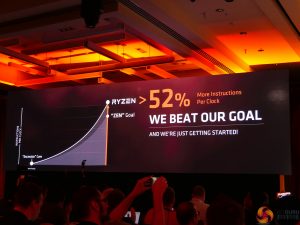
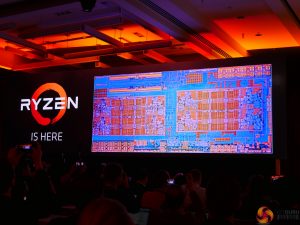
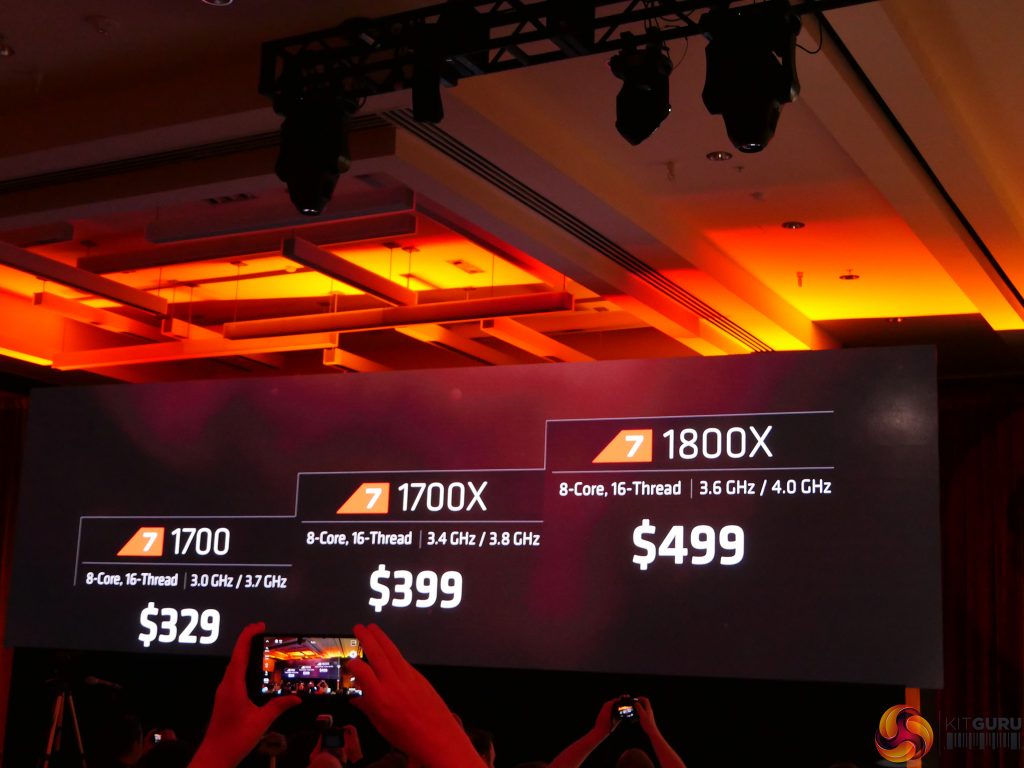
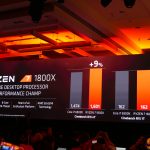

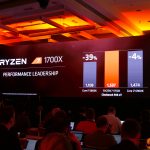
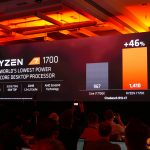
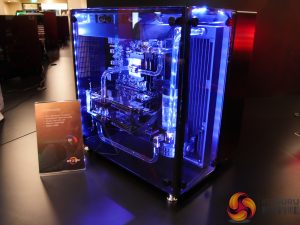
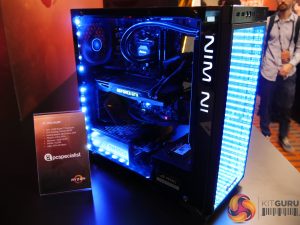
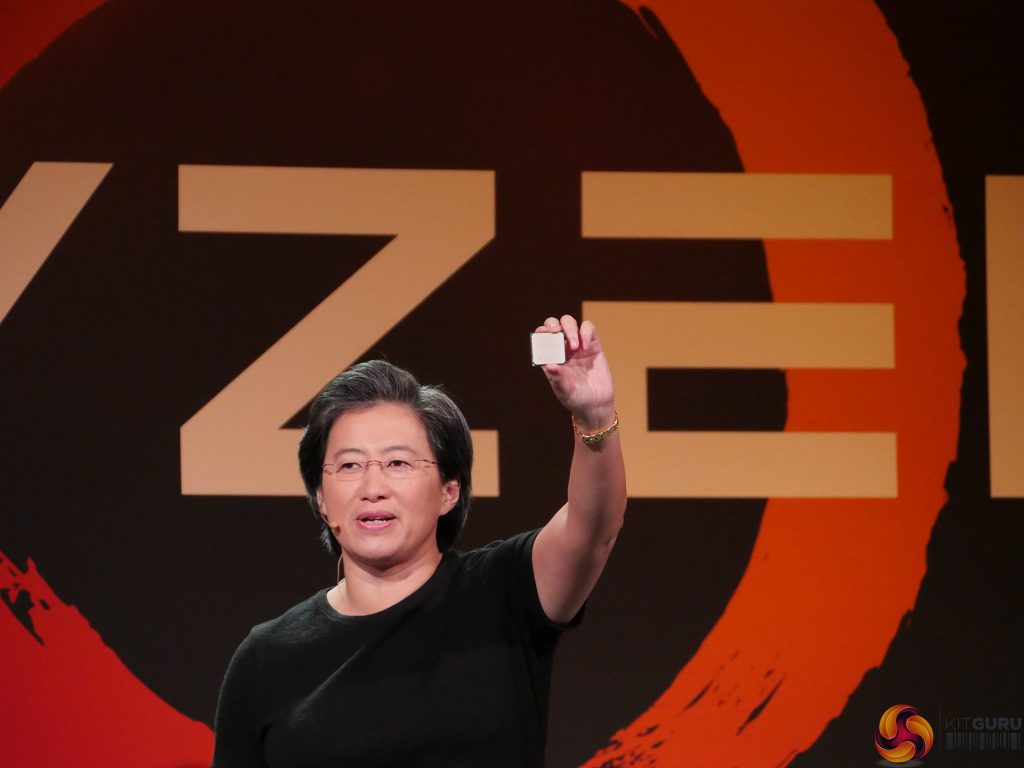

I really hope this performance translates over to gaming and ends Intel’s gaming dominance and market monopoly.
don’t we all 🙂
Zen is love, Zen is Life
#Zenislove_ZenisLife
Interesting that their OctaCore chips are higher frequency than Intel’s, but the expected frequency of their QuadCore chips will be lower. I really hope the Quad and Hex core chips can Seriously overclock; else AMD will continue to rely on higher core counts, which games continue to not utilise effectively…
Well excited 😀
says who, rumors, rumors and “rumored leaks” mean jack, wait for official specs come out AND keep in mind, a lower base speed means something sure, but when Ryzen can constantly monitor and adjust its clocks on the fly in under 1ms(less then a clock tick) in 25Mhz increments vs Intel and its 100Mhz steps.
My point being, we simply do not know how it will all play out until they are released, nor does anyone but AMD know the average performance, constant, boost performance, actual wattage needed (TDP is not wattage) etc,
Cores matter, clock speeds matter of course, but so does how efficient the processing is handled, less pipeline stalls, faster the actual computing is, a 3.4Ghz cpu from a decade ago is WAY slower than a modern 3.4Ghz chip core vs core.
They will all be able to overclock, but, there is never ever any gaurantee that one can expect 500+ Mhz over its rated design speed, that is luck of the draw more then anything else, just cause it 4 core vs 8 core in same family, means very little vs overclock potential, does it free up power levels and TDP limits yes, but it still is a specific design that has certain limits, it may take ALOT of power to push that 3.5Ghz chip to example 4.5Ghz, time will tell.
This is great news for sure and will be good to see decent prices in this market again. I am sure it will over time force Intel to lower their prices a bit to compete with AMD. Wow I thought I would never be able to say that again compete with AMD in pricing and hopefully performance as well.
Linus has a new vid showing the Zen 1700 vs the 6800k in battlefield 1. The 1700 beats the 6800k by a good 5fps. Mind you 6800k is 6-core but i bet most reviewers will still compare AMD’s 8-core to intels 4-core 7700k that clocks at 4.2ghz. I’m pretty confident it will not let you down 🙂
There is blood in the water… Intel can’t make any move to do anything about this… Either they drop prices AND lose share or just lose share… Reminds me of the first Core2Duo… We can assume that the 4/8 will TOTALLY destroy i5…
The 4/4 makes i3 totally obsolete… Intel was planning on mainstream 6 cores later this year but that plan is now out the window… And there is basically ZERO process advantage to lean on…
Even a 20% increase with 7nm means more winning… They may get 40-60%… And it will add Zen+ later…
I agree. Everyone’s making all this predictions without the cold hard facts. Just wait the week until all the NDAs lift, and everyone will know about Ryzen and its potential.
Having said that, I’m still all aboard the Ryzen Hype Train ;D
Mind you in gaming the 7700K beats the 6800K. So the difference between the 1700 and 7700K is gonna be negligible, in fact the 7700K will proly be somewhat faster in games that dont need a lot of threads (which is the case with the majority of games). And Intel will respond by releasing an i5 with HT at a lower price at a lower price than i7 to compete directly with the 1700.
The fact they gave all tech sites Ryzen cpu’s already to start benching and preparing their articles/reviews means they must be confident. I’m so excited!
Seems the rumour leaks were right.
Ryzen beats iCore due to higher clocks and / or higher core counts, while coming in cheaper.
But when it comes to raw IPC, iCore still has the lead. The i7 7700K is indeed still king of the gaming Hill 🙁
And the officially released specs for R5 don’t change that. Their Hex core and Quad core chips will NOT run faster than the OctaCore chips, unlike Intel’s chips where the Quad core chips run faster than any of their HEDT chips.
Oh, and BTW, 1ms isn’t less than a clock tick. On a 4GHz chip, 1ms is 4 million clock ticks.